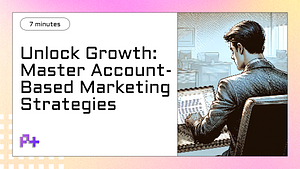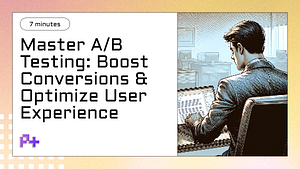1. What is AI Marketing and Why It Matters
AI marketing refers to the integration of artificial intelligence technologies into marketing strategies and practices. This innovative approach leverages machine learning, data analytics, and automation to enhance various aspects of marketing, from customer segmentation and targeting to content creation and campaign optimization. By utilizing AI tools and platforms, businesses can analyze vast amounts of data quickly, allowing them to gain insights into consumer behavior and preferences. As a result, AI marketing not only streamlines processes but also helps marketers make data-driven decisions that improve overall effectiveness.
The importance of AI in marketing cannot be overstated. In today's digital landscape, consumers are constantly bombarded with information, making it challenging for brands to capture attention. AI marketing offers a solution by enabling personalized experiences that resonate with individual customers. For instance, AI algorithms can analyze user interactions and suggest tailored content or product recommendations, thereby enhancing engagement and conversion rates. Moreover, AI-driven chatbots provide real-time customer service, allowing brands to maintain a consistent presence and respond to inquiries around the clock, further solidifying customer relationships.
In addition to improving customer interactions, AI marketing also equips businesses with the tools to optimize their marketing efforts continuously. Predictive analytics, powered by AI, allows marketers to anticipate trends and consumer behaviors, enabling them to adjust their strategies proactively. This adaptability is crucial in an ever-evolving market where consumer preferences can change rapidly. By embracing AI marketing, companies not only gain a competitive edge but also ensure they can meet the demands of modern consumers effectively. Ultimately, AI marketing is not just a trend; it is a fundamental shift in how businesses engage with their audience, making it a vital component of any successful marketing strategy.
2. Benefits of Using AI in Marketing
The integration of AI in marketing has revolutionized how businesses engage with their customers, offering numerous benefits that enhance both efficiency and effectiveness. One of the primary advantages of using AI in marketing is its ability to analyze vast amounts of data quickly and accurately. This capability allows marketers to gain deep insights into customer behaviors, preferences, and trends, enabling them to tailor their strategies accordingly. By leveraging AI-driven analytics tools, businesses can segment their audiences more precisely, ensuring that marketing messages resonate with the right people at the right time, which ultimately leads to higher conversion rates.
Another significant benefit of AI in marketing is the enhancement of customer experience through personalization. AI algorithms can track user interactions across various platforms, enabling brands to deliver personalized content and recommendations that meet individual needs. For instance, recommendation engines powered by AI can analyze previous purchases and browsing history to suggest products that align with a customer's interests. This personalized approach not only boosts customer satisfaction but also fosters brand loyalty, as consumers are more likely to engage with brands that understand and cater to their unique preferences.
Finally, AI in marketing streamlines operations and optimizes resource allocation. By automating routine tasks such as email marketing, social media scheduling, and even customer service inquiries through chatbots, businesses can free up valuable time for their teams to focus on more strategic initiatives. This increased efficiency not only reduces operational costs but also enhances the overall productivity of marketing teams. As AI technologies continue to evolve, their ability to predict market trends and consumer behavior will only improve, making them an indispensable asset for any marketing strategy aiming to stay competitive in today's digital landscape.
3. Practical Use Cases of AI in Marketing
Artificial Intelligence (AI) has revolutionized the marketing landscape by enabling businesses to enhance their strategies and optimize customer engagement. One of the most practical use cases of AI in marketing is predictive analytics. By analyzing vast amounts of data, AI algorithms can identify trends and forecast customer behaviors, allowing marketers to tailor their campaigns effectively. For instance, companies like Netflix and Amazon utilize predictive analytics to recommend products or content based on individual user preferences, significantly increasing user satisfaction and retention. This data-driven approach not only helps in personalizing marketing efforts but also in making informed decisions about inventory management and resource allocation.
Another compelling application of AI in marketing is chatbots and virtual assistants. These AI-driven tools provide real-time customer support, answering inquiries and resolving issues around the clock. Chatbots can handle multiple customer interactions simultaneously, providing instant responses and freeing up human agents for more complex tasks. This not only enhances user experience but also reduces operational costs for businesses. For example, brands like Sephora and H&M have successfully implemented chatbots that engage customers by offering personalized product recommendations, thereby increasing conversion rates and driving sales.
Lastly, AI-powered content creation is transforming how marketers produce and distribute content. Tools like GPT-3 and other natural language processing models can generate high-quality written content, from blog posts to product descriptions, with minimal human intervention. This capability allows marketers to scale their content marketing efforts efficiently, ensuring that they consistently deliver fresh and relevant material to their audience. Additionally, AI can analyze which types of content perform best, enabling marketers to refine their strategies and focus on high-impact topics. By leveraging AI in content creation, businesses can save time, reduce costs, and improve their overall marketing effectiveness.
4. Best Practices for Integrating AI into Your Marketing Strategy
Integrating AI into your marketing strategy can significantly enhance efficiency, improve customer engagement, and drive sales. To effectively leverage AI technology, it is essential to adopt best practices that align with your business goals. One of the first steps is to clearly define your objectives. Whether you aim to enhance customer service through chatbots, personalize email marketing campaigns, or analyze consumer behavior, having specific goals will guide your AI implementation process. This clarity not only helps in selecting the right tools but also ensures that your marketing team stays focused on achieving measurable outcomes.
Another best practice is to invest in the right AI tools tailored to your marketing needs. The market is flooded with various AI applications, from predictive analytics to customer segmentation. Conduct thorough research to identify solutions that fit your business size and sector. For instance, using AI-driven analytics platforms can provide insights into customer preferences, allowing for more targeted campaigns. Additionally, incorporating AI tools that automate repetitive tasks, such as social media scheduling or content curation, can free up your team to focus on creative strategies, ultimately leading to more effective marketing efforts.
Lastly, fostering a culture of continuous learning and adaptation is crucial when integrating AI into your marketing strategy. The landscape of AI technology is constantly evolving, and staying updated with the latest trends and tools is vital. Encourage your marketing team to participate in training sessions, workshops, and industry conferences that focus on AI advancements. Moreover, regularly review and analyze the performance of your AI-driven initiatives to refine your approach. By embracing a mindset of innovation and flexibility, your marketing strategy can not only keep pace with technological advancements but also leverage AI’s full potential to drive growth and enhance customer relationships.
5. The Future of AI in Marketing: Trends and Predictions
The future of AI in marketing is poised to revolutionize how brands engage with customers, optimize campaigns, and analyze data. As we move deeper into the digital age, the integration of AI technologies such as machine learning, natural language processing, and predictive analytics will become essential for marketers seeking to stay competitive. One trend to watch is the rise of hyper-personalization, where AI tools analyze consumer behavior to deliver tailored content and product recommendations. This level of personalization not only enhances user experience but also drives higher conversion rates, making it a crucial strategy for brands in the coming years.
Another significant trend is the automation of marketing processes. AI-powered tools are increasingly being used to streamline everything from content creation to customer service interactions. For instance, chatbots equipped with advanced AI can handle customer inquiries 24/7, providing instant responses while freeing up human resources for more complex tasks. Additionally, AI can automate data analysis, helping marketers quickly glean insights from vast datasets and adjust their strategies in real time. As these technologies evolve, we can expect to see even more sophisticated applications, allowing marketers to allocate their resources more efficiently and effectively.
Looking ahead, we can predict that ethical considerations will play a larger role in how AI is used in marketing. As consumers become more aware of data privacy issues, brands will need to navigate the fine line between utilizing AI for personalized marketing and respecting user consent. The implementation of transparent AI practices will not only build trust but also enhance brand loyalty. Overall, the future of AI in marketing promises to be dynamic and transformative, offering both exciting opportunities and challenges that marketers must address to remain relevant in a rapidly changing landscape.



